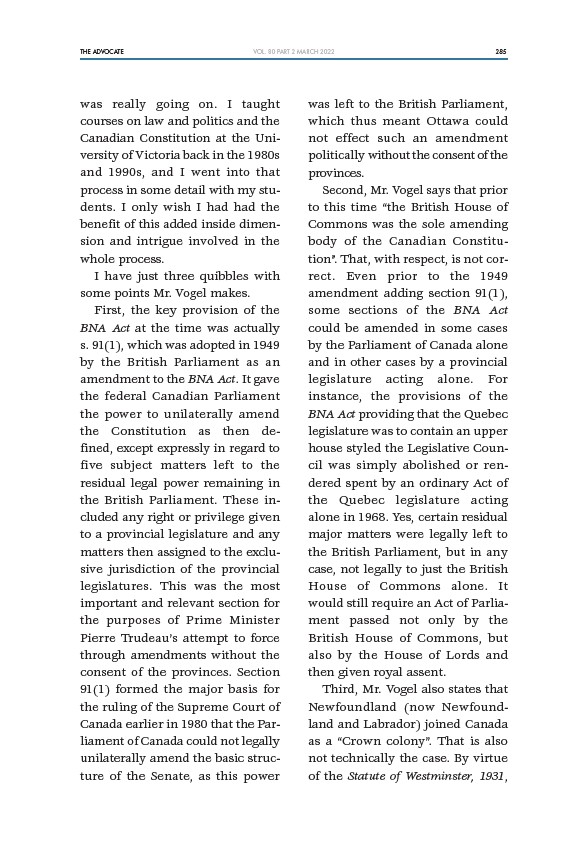
THE ADVOCATE 285
VOL. 80 PART 2 MARCH 2022
was really going on. I taught
courses on law and politics and the
Canadian Constitution at the University
of Victoria back in the 1980s
and 1990s, and I went into that
process in some detail with my students.
I only wish I had had the
benefit of this added inside dimension
and intrigue involved in the
whole process.
I have just three quibbles with
some points Mr. Vogel makes.
First, the key provision of the
BNA Act at the time was actually
s. 91(1), which was adopted in 1949
by the British Parliament as an
amendment to the BNA Act. It gave
the federal Canadian Parliament
the power to unilaterally amend
the Constitution as then defined,
except expressly in regard to
five subject matters left to the
residual legal power remaining in
the British Parliament. These included
any right or privilege given
to a provincial legislature and any
matters then assigned to the exclusive
jurisdiction of the provincial
legislatures. This was the most
important and relevant section for
the purposes of Prime Minister
Pierre Trudeau’s attempt to force
through amendments without the
consent of the provinces. Section
91(1) formed the major basis for
the ruling of the Supreme Court of
Canada earlier in 1980 that the Parliament
of Canada could not legally
unilaterally amend the basic structure
of the Senate, as this power
was left to the British Parliament,
which thus meant Ottawa could
not effect such an amendment
politically without the consent of the
provinces.
Second, Mr. Vogel says that prior
to this time “the British House of
Commons was the sole amending
body of the Canadian Constitution”.
That, with respect, is not correct.
Even prior to the 1949
amendment adding section 91(1),
some sections of the BNA Act
could be amended in some cases
by the Parliament of Canada alone
and in other cases by a provincial
legislature acting alone. For
instance, the provisions of the
BNA Act providing that the Quebec
legislature was to contain an upper
house styled the Legislative Council
was simply abolished or rendered
spent by an ordinary Act of
the Quebec legislature acting
alone in 1968. Yes, certain residual
major matters were legally left to
the British Parliament, but in any
case, not legally to just the British
House of Commons alone. It
would still require an Act of Parliament
passed not only by the
British House of Commons, but
also by the House of Lords and
then given royal assent.
Third, Mr. Vogel also states that
Newfoundland (now Newfoundland
and Labrador) joined Canada
as a “Crown colony”. That is also
not technically the case. By virtue
of the Statute of Westminster, 1931,